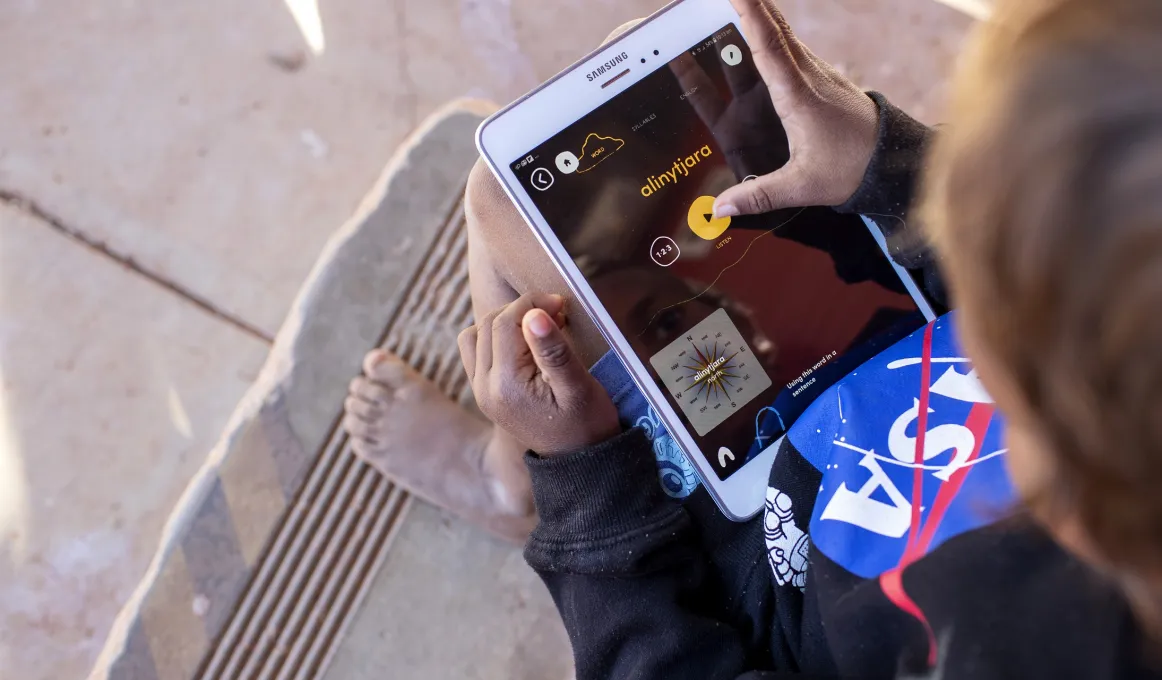Digital platform supporting the revitalisation of Indigenous First Languages

The Living First Languages Platform supports the revitalisation of Indigenous First Languages, allowing communities to develop dynamic digital language and literacy resources.
Language plays a crucial role in everyone’s lives. Everything we know about ourselves is tied to our language; it’s vital to the development of personal and community health, and the preservation of culture and knowledge.
Australia has among the highest rate of language shift in the world; only around 145 of the over 250 original Aboriginal and Torres Strait Islander languages are still spoken. Of these, approximately 75 per cent are endangered.
The Living First Languages Platform, developed by the Australian Literacy and Numeracy Foundation, is a technology-based solution that supports communities to document, teach and ultimately revitalise Indigenous First Languages.
The Platform, developed in conjunction with communities, allows users to record and store speech sounds, letters, words, songs and stories as a multi- sensory, interactive collection of language and literacy knowledge.
Eric Brace, Programs Director at the Australian Literacy & Numeracy Foundation, said they developed the platform with the view to it being a community generated and driven process.
‘We’ve taken a user-focused approach to create a really intuitive, easy-to-use, lightweight tool,’ Eric said.
Communities can directly manage the development of the tool, inputting words recordings, images and text into the Platform themselves. In doing so, the Platform serves as an interactive resource communities can leverage in their role as the custodians and caretakers of their own languages.
‘Using the Platform, communities can collaboratively create a digital resource – which also uses the principles of speech pathology to explore language and literacy in Indigenous First Languages.’
The Platform is winning plaudits around the world. In early 2019, the Platform won in its category of ‘Innovation in Connecting People’ at the South by Southwest Innovation Awards in Austin, Texas. More recently, the platform was announced as a one of 40 winners from 26 different countries in the 2019 UN-based World Summit Awards (WSA). ALNF Co-chair, Professor Tom Calma AO will represent the ALNF at the WSA event in Vienna to accept the award in March this year.
The team has also been involved in MIT Solve initiative, taking part in the global challenge for early childhood development.
‘MIT Solve is a nine-month process with access to a broad network of socially minded start-ups and innovators. As part of this, we’re being mentored by the Harvard Centre for the Developing Child,’ Eric said.
‘It’s helping us to further align our platform and our programming to the science of early childhood development, so we can work to develop an engaging resource which combines face-to-face interaction and technology.’
But awards aside, the Foundation is focused on futureproofing the platform, and developing a platform that allows for innovation to be led by community needs and interests.
‘We’re discussing future uses for the platform in communities, including how we can develop a robust resource and database that invites creativity,’ Eric said.
‘This product is by communities, for communities; our focus is on how we can support community-driven language and literacy teaching and learning in Australia’s First Languages.’
Find out more
Read more about the app at Australian Literacy and Numeracy Foundation.
The National Indigenous Australians Agency is providing funding to bring four new languages onto the platform.